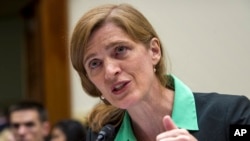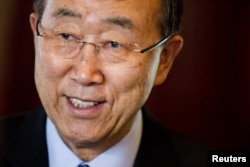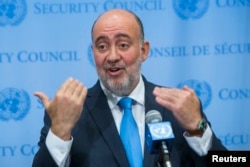The Iran nuclear agreement process is expected to move next week to New York, where the U.N. Security Council will adopt a resolution lifting all international sanctions related to the Islamic Republic’s nuclear program. But a U.N. arms embargo will remain in place for five years and one on ballistic missiles will continue for eight years.
U.S. Ambassador to the United Nations Samantha Power said in a statement the United States will submit a draft Security Council resolution “in the coming days” on behalf of the five powers, Germany and the European Union. She said it will endorse the deal and “take other important steps, including replacing the existing Security Council sanctions architecture with the new, binding restrictions agreed on in Vienna.”
Opposition in the 15-nation Council is unlikely, as the five veto holding Council members – Britain, China, France, Russia and the United States – are all parties to the deal.
Former U.S. Secretary of State Madeleine Albright told VOA Tuesday that the deal “is a big step forward.” She said it is now a process that will have to be verified and carried out, adding “I think it is very important for the region, and frankly for security generally.”
No. 1 goal
Key Points of Iran Nuclear Accord
Key Points of the Iran Nuclear Deal
- Iran will reduce stockpile of low-enriched uranium by 98 percent to 300 kg for 15 years
- Iran will reduce by two-thirds the number of centrifuges operating to enrich uranium at its main processing center
- Iran is prevented from designing warheads or conducting experiments on nuclear weapons-related technology.
- Arms embargo on Iran will be eased, as long as IAEA judges Iran's nuclear program to be peaceful.
- International sanctions on Iran will be lifted, enabling it to export oil.
- If an international panel finds Iran is not honoring the accord, it can vote to restore sanctions.
Richard Gowan, a fellow at the New York University Center on International Cooperation, says sanctions relief was Iran’s “number one goal” during the two years of nuclear negotiations.
The United States has made clear, however, that if Iran violates the deal, sanctions would “snap back” into place. But Gowan says that could be difficult at the United Nations.
“At the end of the day, putting sanctions back in place could come down to an argument in the Security Council.” He said that could put the United States, Russia and China at odds, “because Moscow and Beijing are going to resist any effort to put sanctions back on Tehran. But the hope is the special commission that is being set up to monitor the deal will be a more congenial environment for the big powers to work on Iran’s performance.”
That joint commission will consist of the P5+Germany and Iran, and will be established to monitor implementation of the deal.
Ban Ki-moon welcomes deal
U.N. Secretary-General Ban Ki-moon welcomed Tuesday's agreement, calling it “historic” and adding that it is a “testament to the value of dialogue.” He said he hopes the deal will lead to “a greater mutual understanding and cooperation on the many serious security challenges in the Middle East.”
Iran has stakes in the conflicts in Iraq, Syria and Yemen that have put it at odds with the West and Arab countries. Middle East Institute scholar Randa Slim is not optimistic the nuclear deal will provide a quick opening for resolutions to these conflicts.
“I don’t think it will change much in the short-term to medium-term,” she said. “In fact there are other regional actors whose positions will be hardened as a result of the Iran deal. Especially Arab actors.” She said the Arabs would likely wait for signals from Tehran that it is willing to change its posture regarding these conflicts.
Israeli opposition
Israel has also been adamantly against the deal. Its U.N. Ambassador Ron Prosor said in a statement that despite the deal, Iran continues to be “a religiously fanatic state" that "acts to fund and promote terror all over the world.” He criticized world powers for striking an accord with Tehran, adding, “On the dawn of this new day, they can lean back comfortably, and act without limitations, with newfound economic prosperity, and with a broad smile on their faces. Tomorrow, the rest of the world will pay the price.”
NYU’s Gowan says the fact there is a deal at all at a time when U.S. relations with Russia and China are deteriorating “is a real success for the Obama administration and for the U.N. system more generally.”






